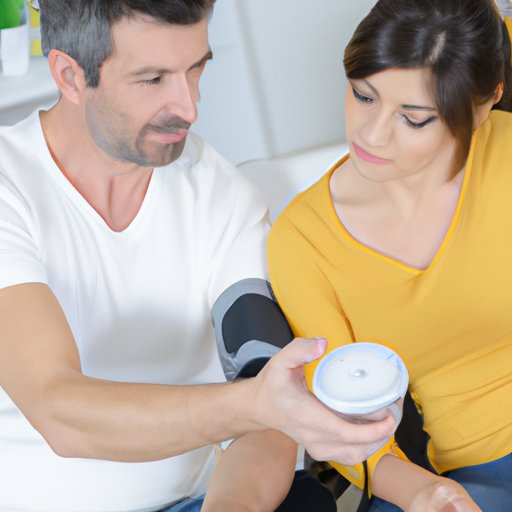Introduction
Blood pressure is a measurement of the force of the blood pushing against the walls of your arteries. It’s an important indicator of your overall health, and it’s essential to keep it under control. But does working out raise blood pressure? Let’s take a closer look at the effects of exercise on blood pressure levels.

Examining the Effects of Exercise on Blood Pressure
It’s no secret that physical activity is beneficial for your health. But how does exercise impact your blood pressure? The answer depends on several factors, including your age, weight, and fitness level.
How Working Out Impacts Blood Pressure Levels
When you start exercising, your heart rate and breathing rate increase. This causes your blood pressure to rise temporarily as your body works harder to deliver oxygen-rich blood to your muscles. However, regular exercise can actually help lower your blood pressure in the long run. Studies have shown that aerobic exercise can reduce systolic blood pressure (the top number in a BP reading) by up to 9 mmHg, and diastolic blood pressure (the bottom number) by up to 6 mmHg.
Exploring the Relationship Between Exercise and Hypertension
For those with hypertension (high blood pressure), exercise can be especially beneficial. Regular physical activity can help reduce blood pressure and improve cardiovascular health. In fact, research suggests that just 30 minutes of moderate-intensity exercise per day can significantly lower blood pressure levels and reduce the risk of stroke and heart attack.
Uncovering the Link Between Physical Activity and High Blood Pressure
It’s clear that exercise can have a positive effect on blood pressure. But what types of exercises are best for those with high blood pressure? Let’s take a closer look at the link between physical activity and high blood pressure.
Investigating the Impact of Exercise on Blood Pressure Readings
Aerobic exercises, such as walking, jogging, swimming, and biking, are all good options for those with high blood pressure. These activities can help the heart pump more efficiently, which can lead to lower blood pressure readings. Strength training, such as lifting weights, can also help to reduce blood pressure levels.
Assessing the Benefits of Regular Exercise on Blood Pressure
Regular exercise can have a number of benefits for those with high blood pressure. Not only can it help to lower blood pressure readings, but it can also reduce stress, improve sleep, and boost mood. All of these factors can contribute to overall better health and wellbeing.
Is Working Out Good for Your Blood Pressure?
Working out can be beneficial for those with high blood pressure, but there are some risks associated with exercising too much. Those with hypertension should talk to their doctor before starting a new exercise program.
Types of Exercises That Can Help Lower Blood Pressure
Aerobic exercises, such as walking, jogging, swimming, and biking, are all good options for those with high blood pressure. Strength training, such as lifting weights, can also help to reduce blood pressure levels. It’s important to start slowly and gradually increase the intensity of your workouts over time.
Risks Associated With Working Out and High Blood Pressure
It’s possible to overdo it when it comes to exercise. Too much physical activity can cause your blood pressure to spike suddenly. This can put extra stress on your heart and increase your risk of a heart attack or stroke. It’s important to talk to your doctor about what type and intensity of exercise is safe for you.
Conclusion
In conclusion, exercise can be beneficial for those with high blood pressure. Regular physical activity can help to lower blood pressure readings and reduce the risk of stroke and heart attack. However, it’s important to talk to your doctor before starting a new exercise program, as too much physical activity can cause your blood pressure to spike suddenly.
(Note: Is this article not meeting your expectations? Do you have knowledge or insights to share? Unlock new opportunities and expand your reach by joining our authors team. Click Registration to join us and share your expertise with our readers.)
